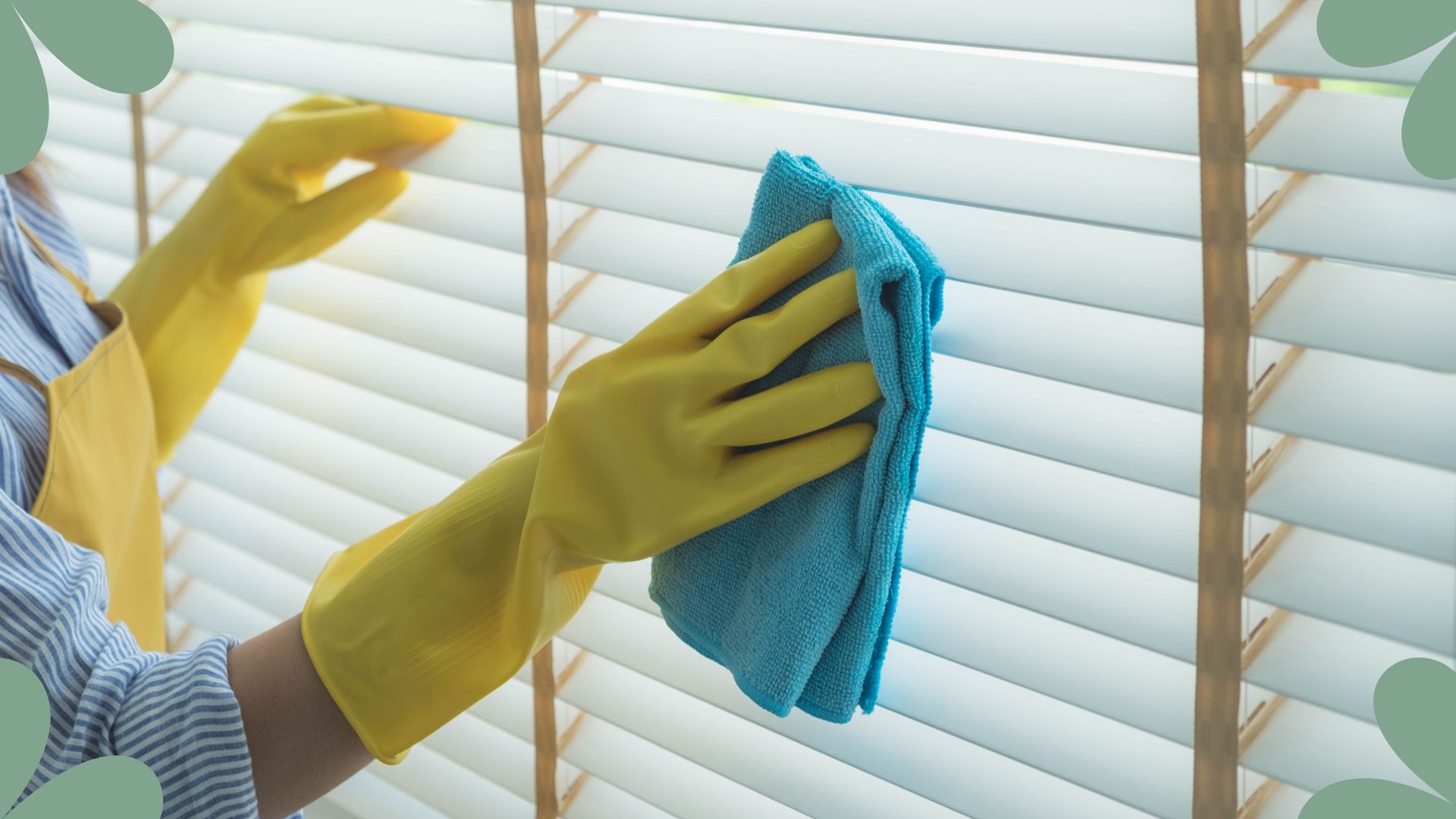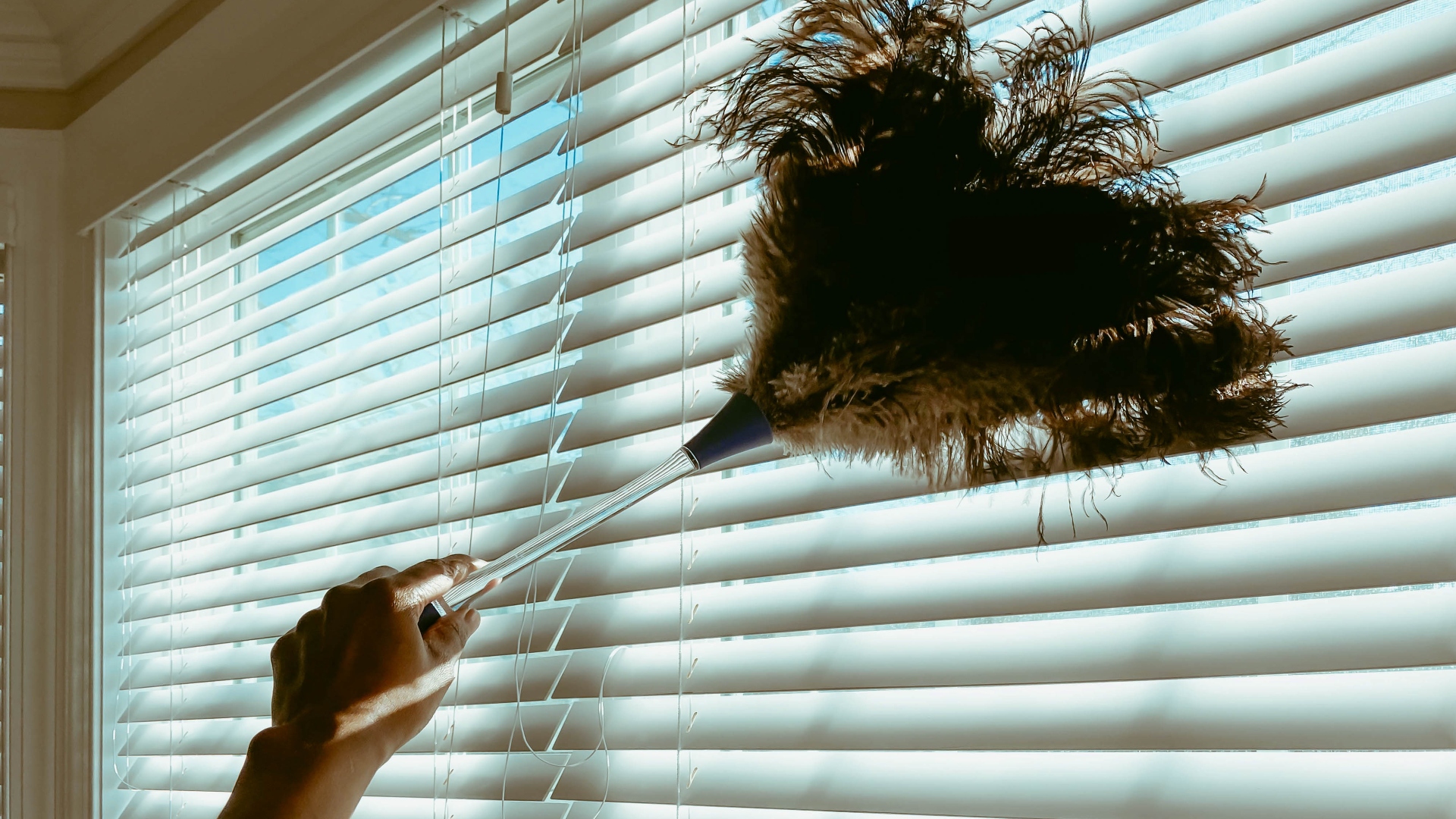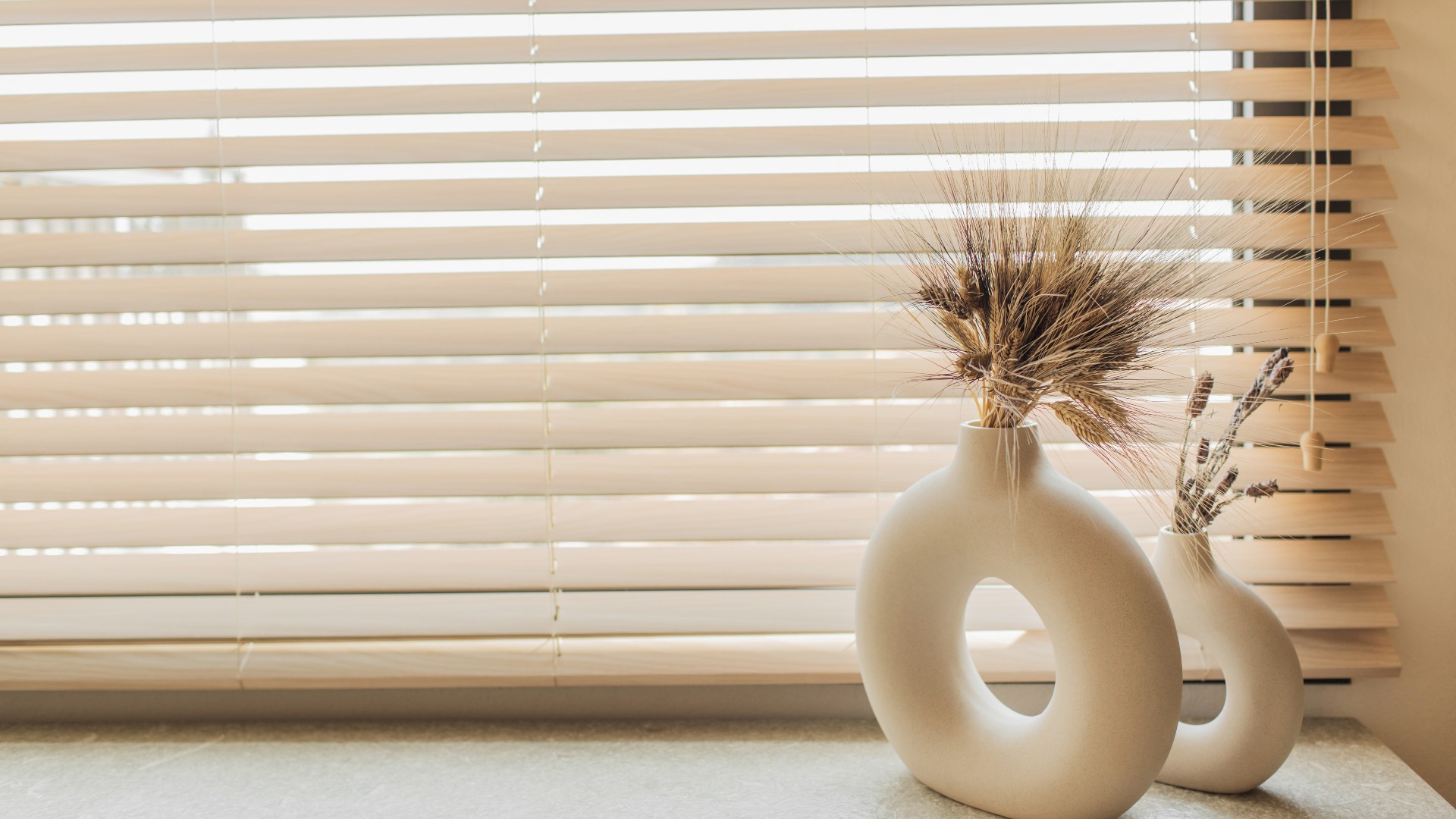How to clean blinds: 7 expert tips for keeping them dust-free
Follow our easy guide on how to clean blinds to keep them dust-free and fresh all year round

It’s important to know how to clean blinds properly to make sure you avoid dust building up in your home.
If you think you know how to clean blinds efficiently, you might want to think again because certain sprays and chemicals can damage your blinds – and so can leaving water on them for too long. So if you're thinking of giving your home a spring clean, make sure you read our guide on how to clean blinds properly before you grab your cleaning products.
We ask experts in the world of homes and professional cleaners for the best methods to clean blinds, safely and efficiently to avoid dust build-up.
How to clean blinds
Cleaning blinds is one of those household tasks we put off, or simply don't even think about doing. But when it comes to cleaning blinds, it's less tricky than you think and a simple method can work on several types of blinds.
"Cleaning blinds can be a tricky task, but there are several effective methods that you can use to do it well," says Fantastic Services cleaning supervisor Lily Cameron.
While cleaning experts at Airtasker adds, "Venetian blinds are one of those things people often forget (or avoid) to clean. These blinds could also be difficult to deal with, especially when dust, dirt, and stains have built up."
"Regular or light cleaning is the easiest way to clean your blinds. It's less time-consuming and can be done once every few days without taking down the blinds. With consistent light cleaning, you minimize or eliminate the need to give your blinds a deep clean."
Sign up for the woman&home newsletter
Sign up to our free daily email for the latest royal and entertainment news, interesting opinion, expert advice on styling and beauty trends, and no-nonsense guides to the health and wellness questions you want answered.
To get ready to clean your blinds, you'll need the following:
- A clean microfibre cloth
- Feather duster or a vacuum cleaner fitted with a soft brush attachment
- A soft sponge
- One bucket of warm water
- Dish soap and/or a window cleaning or blind cleaning spray.
But be careful, as the team at Airtasker warn, "Before using a cleaning solution on your blinds, do a test sample on a small area first. This will help you ensure that the solution is safe to use and wouldn’t cause discoloration or any other damage to your blinds."
So with this in mind, grab your cleaning essentials from under the kitchen sink and follow these steps on how to clean blinds.
1. Close your blinds
While this isn't absolutely necessary to clean your blinds, according to experts at Airtasker, it can be helpful to close your blinds so that one side is flat and facing you, making it easier to cover the entire blind. It also means you won't get the sun in your eyes while you're cleaning.
2. Dust away the debris

Cleaning experts suggest that if you have closed your blinds, grab your feather duster or cloth to effectively get rid of dust. Dust one side of the slats from one end to the other, or from the topmost slat to the bottommost slat. Then dust the other side.
Lily adds, "Simply run the cloth or duster over the blinds to remove dust and dirt. When doing so, make sure to dust both sides of the blinds, including the slats and the top of the headrail."
Cleaning expert and Instagram influencer Laura Mountford adds, "If you have horizontal blinds then you can get a specific duster for blinds which has microfibre cloth attachments to clean multiple slats at the same time, making it a much quicker job."
3. Choose your wet cleaning solution
Once you've removed the loose debris with your feather duster or clean microfibre cloth, you need to choose your wet cleaning solution. Either fill a bucket of warm water and add a small amount of dish soap, or grab some window or blind cleaner.
"Mix the solution until it is evenly distributed," advises Ivo Iv, owner of the home inspiration destination Decor Home Ideas. "Then dip your microfiber cloth or sponge into the cleaning solution and wring out any excess water. Be careful not to soak the cloth, as this can damage the blinds." Use caution, the same as you would when cleaning laminate floors or cleaning hardwood flooring.
Remember, if you're using a cleaner, test it on a small section first to ensure it doesn't damage your blinds.
4. Wipe down the blinds
Now your blinds are dust-free, you can get stuck into cleaning them with your wet solution to remove dirt.
As when cleaning mirrors, it's all about using the right technique. "Starting from the top of the blinds, gently wipe each slat with the damp cloth, being careful not to bend or break them," says Ivo. "Work your way down the blinds, rinsing the cloth frequently in the cleaning solution to remove dirt and debris."
5. Focus on stubborn dirt marks
If your blinds are particularly dirty, or the step above hasn't removed all of the stubborn dirt or grease marks, you can give your blinds a deep clean.
This involves, essentially, giving your blinds a bath! It requires taking the blinds down from the windows, so bear that in mind.
Lily suggests, "For blinds that are heavily soiled, you can try washing them. Fill a bathtub or another large container with warm water and add a few drops of dish soap. Then remove the blinds from the window and place them in it. Gently scrub them with a soft brush or sponge." It's important not to leave them to soak for too long, to avoid potential damage to the material.
6. Rinse with clean water
Now that your blinds have been cleaned, you need to rinse them to ensure that your cleaning solution doesn't linger on the slats, as this can damage your blinds.
"Once you have cleaned all of the slats, rinse the blinds with clean water using a spray bottle or clean cloth," advises Ivo. "This will help to remove any remaining soap residue."
If you've given your blinds the deep clean in a tub, after you've rinsed them with water, hang them to dry completely before reinstalling them.
7. Finish with a final wipe to dry

Making sure you dry your blinds after cleaning them is essential to prevent any damage, similar to when washing your pillows. So for this last step, don't reuse a cloth that you already used during the cleaning process.
"Finally, use a clean, dry cloth or towel to remove any excess water from the blinds," says Ivo. "Be sure to dry them thoroughly to prevent water damage or mold growth."
And cleaning expert Laura has a pro tip. "Once your blinds are dry my top tip is to wipe using a tumble dryer sheet," she says. "They are a great way to remove any static, dust and they leave your blinds smelling divine!" A smart way to make your house smell good while you clean.
What is the best way to clean blinds without taking them down?
To clean your blinds without taking them down, you can simply follow the steps above, but avoid step number 5 which involves taking them down and immersing them in a bath tub of water.
Fantastic Service's cleaning supervisor, Lily Cameron, has some tips for if your blinds are particularly dirty but you don't want to take them down.
"Invest in a cleaning tool specifically designed for blinds," she suggests. "There are several cleaning tools on the market that are specifically designed for cleaning blinds. They usually have multiple microfibre fingers that can clean several slats at once. They're also flexible and make cleaning hard-to-reach areas very easy."
Alternatively, she suggests using the soft attachment on your vacuum cleaner. "If you have a vacuum cleaner with a brush attachment, you can use it to clean your blinds without taking them down," she says. "Use it to gently remove dust and dirt from the slats."
How do you clean vinyl blinds?
When it comes to cleaning vinyl blinds, you can follow the steps above, you just need to be more careful when choosing your cleaning solution.
"To clean vinyl blinds specifically, it is important to use a mild cleaning solution and avoid using harsh chemicals or abrasive cleaning tools that could scratch or damage the vinyl," warns Ivo Iv of Decor Home Ideas.
So for vinyl blinds, it might be best to stick to warm water and a small amount of dish soap, rather than a harsh chemical spray.
Another option is cleaning with vinegar, using equal parts water and vinegar. Fantastic Service's Lily Cameron says, "Spray the solution onto a microfibre cloth or a duster and gently wipe the slats clean. This solution not only cleans the blinds but also disinfects them."
Or for tougher stains, she suggests a mixture of water and baking soda. "Mix baking soda and water in a bowl until it forms a paste, then apply the paste to the stained areas of the blinds," she explains. "Let the paste sit for 15 to 20 minutes and use a damp cloth to wipe it away. The stain should come off as well."

How do professionals clean blinds?
Professional cleaners use the methods they have recommended above when cleaning homes on a regular basis. If the blinds in question need a deeper cleaning they tend to use specialized equipment.
Decor Home Ideas's Ivo Iv explains, "Some professionals may use ultrasonic cleaning, which involves placing the blinds in a tank of water and using high-frequency sound waves to agitate and remove dirt and debris. Other professionals may use steam cleaning or dry cleaning methods, depending on the type of blinds and the level of cleaning required."
And Lily Cameron from Fantastic Services adds, "Ultrasonic cleaning is very effective and efficient, but it’s usually expensive. Another method professional cleaning companies use is steam cleaning. A special steam cleaning tool is used to blast the blinds with hot, pressurized steam, which loosens and removes dirt and debris from the slats. Steam cleaning is effective and safe for most types of blinds."
Revealing other methods professionals may use, Lily says, "Some professional cleaning companies use a dry cleaning method, which involves using a special powder that's applied to the blinds and then brushed off. The powder attracts dirt and grime, which is then removed along with the powder.
"Some professional cleaners may also hand clean the blinds, using a combination of specialized cleaning solutions and tools. This method is time-consuming but can be very effective for heavily soiled or delicate blinds."
Robyn is a celebrity and entertainment journalist and editor with over eight years experience in the industry. As well as contributing regular to woman&home, she also often writes for Woman, Woman's Own, Woman's Weekly and The Sun.